Fil-Ams braving frontlines against coronavirus
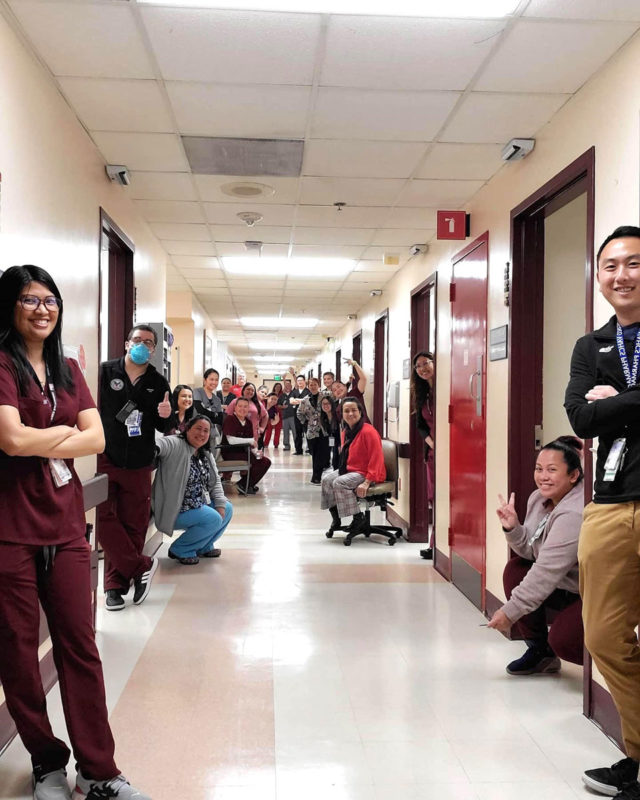
Nurse Cora Aquino (third from left, squatting, in light blue trousers) holds the fort at the Emergency Department in Kaiser South San Francisco and the Veterans Administration clinic in San Francisco (group photo showing 6-foot social distancing). CONTRIBUTED
DALY CITY, California – Many Filipino Americans are stepping up to the frontlines against the coronavirus pandemic, to protect the public, model safety guidelines and fill essential needs.
Between medical centers and supermarkets, Fil-Am employees in the San Francisco Bay Area bravely lay their personal safety on the line, learning lessons along the hazardous way.
With a name like hers Corazon Aquino draws extra attention from Filipino patients, but the emergency department nurse at Kaiser Permanente in South San Francisco who also staffs the Veterans Administration clinic in San Francisco is fully focused on responding to the “increased volume” of patients due to the outbreak.
Focused
“We start with a huddle updating us on new policies and procedures to handle PUI (persons under investigation or those waiting for virus test results). We get reports from outgoing nurses and at the end of the shift we give reports to incoming nurses,” she described her first tasks to INQUIRER.net. “We make sure we put our PPE (personal protection equipment) and mask for every patient and strictly have no visitors.”
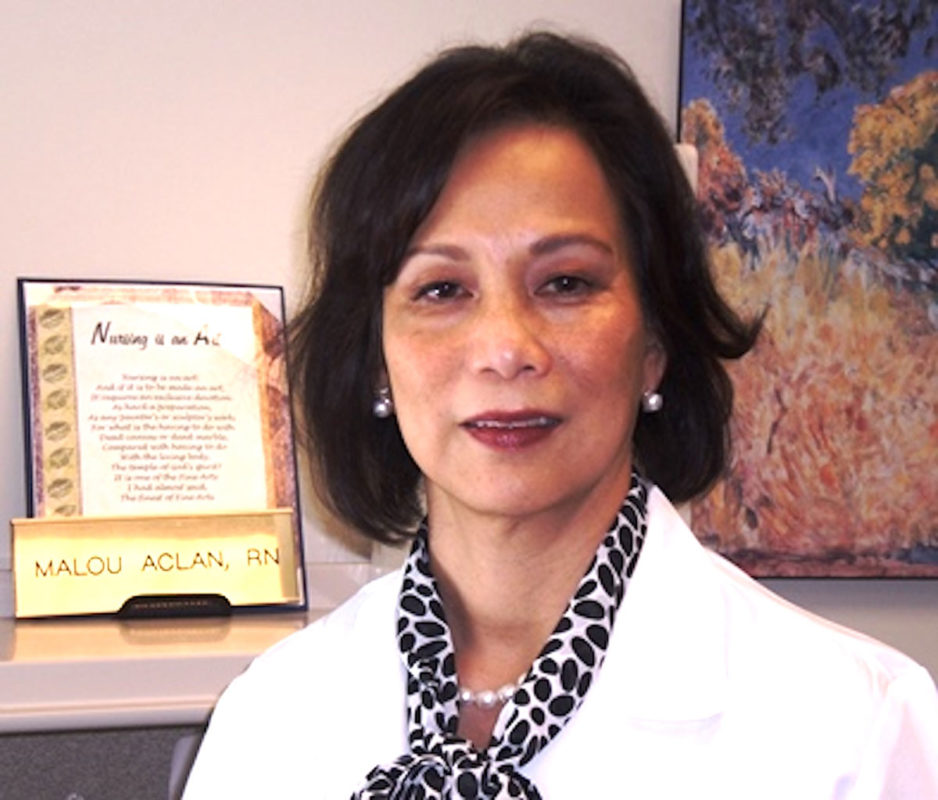
Malou Aclan, RN, has never confronted a crisis like the coronavirus outbreak. CONTRIBUTED
Aquino shares the first Philippine woman president’s name and dedication, perhaps also her extreme caution.
“It’s hard to determine who are infected and carriers of the disease,” said the double frontliner, who sanitizes her shoes before she leaves work, separates her uniform and showers soon as she gets home.
In Malou Joson Aclan, a registered nurse for 45 years now, has never confronted an equation with so many unknown factors. Her role as cardiology department care manager has devolved to telephone consults, and her heart health classes have been canceled. Yet, her “workload has increased remarkably to accommodate patients and family who are anxious about their heart condition.”
Most of those affected who have died from the virus are older adults, the rate of incidences worldwide show.
Aclan, mother to a male nurse whose wife is also a nurse, prescribes a “good sense of humor” to preserve morale. These last weeks she has “learned to take my time,” and more: “Be more mindful of small stuff, things that did not seem to matter before. Listen more, communicate better and don’t be in a rush all the time.”
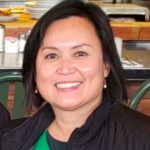
Home care staff provider Angela Japson Encarnacion is on-call 24/7. CONTRIBUTED
Owning Always Best Care-Peninsula for 12 years has made Angela Japson Encarnacion an expert in caring for older persons and people with disabilities, both patients and employees.
The proprietor of the home care staffing agency undergoes regular training for herself and staff as mandated by the corporate office. She can’t remind employees often enough about universal infection control, particularly at this time.
“From Day 1, that’s been part of the training. Don’t take anything from granted. Be vigilant and know the symptoms. Be objective at all times.”
Lately, the mood at her San Bruno office has been “chaotic and stressful,” she admitted, prompting her to bring home-cooked lunches to “break the sadness and fear, and at the same time be productive.”
Cancellation of annual health fairs where she volunteers keeps her present at the headquarters to support her 35 predominantly Filipino employees. At the end of her day, she relaxes by watching Filipino soaps, she says with a laugh, or a movie with her husband. No matter how her day goes, she calls her two sons, family and friends at night and ends with a prayer of gratitude.
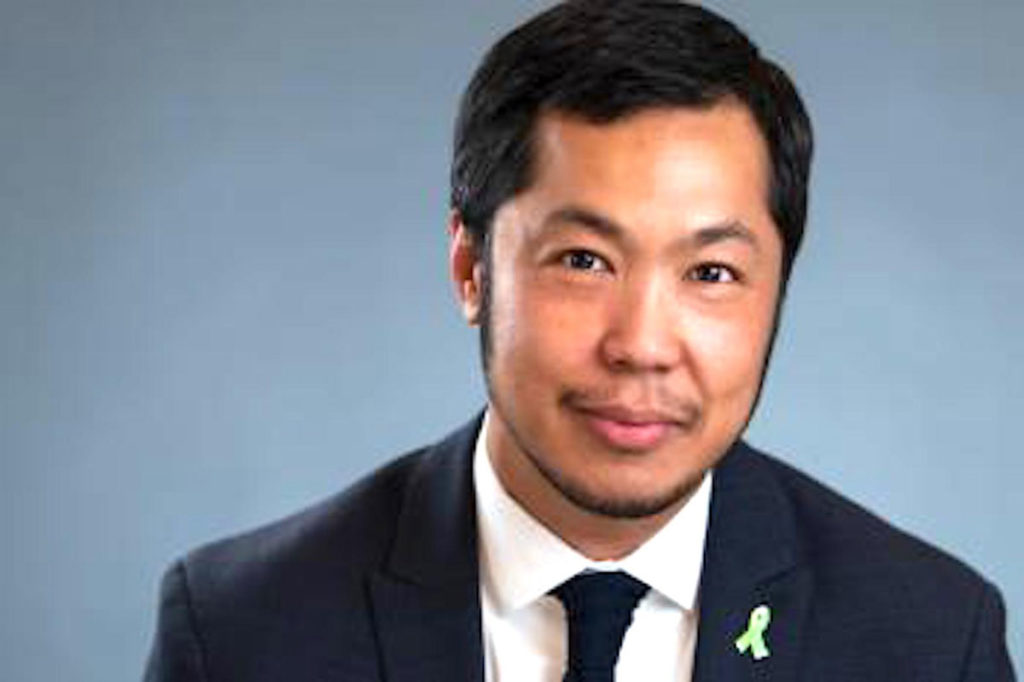
Dr. Jei Africa reminds of self-care of the body and the mind. CONTRIBUTED
She sleeps with her cellphone, takes calls “no matter what time it is” to keep tabs on her clients and staff.
First responders require support now more than ever.
Beyond the physical
“Ensuring that we are able to provide our services is crucial because many of the people we work with are really high-risk or vulnerable,” said clinical psychologist Dr. Jei Africa, director of Behavioral Health and Recovery Services in the County of Marin, north of San Francisco. He oversees provision of care for individuals with mental health and substance abuse conditions.
Honored in 2015 by California Psychological Association with the Distinguished Humanitarian Contribution Award for advancing health equity and social justice, Africa expressed admiration for the courage displayed by his staff.
“One one hand, there is a sense of anxiety, concern and urgency on all fronts. Our staff are considered disaster workers, many of them are continuing to provide essential services to those in need. On the other end, my staff remain committed to continuing their work and serving the clients: the passion and commitment is stronger than ever.”
Some employees work from home, he said, but a limited crew remains on site for “those who are in crisis and have urgent mental health and substance abuse needs.”
Dr. Africa urges the public to follow safety recommendations beyond the physical.
“It’s important to keep perspective through it all: address the things we can control, while letting go of the things we have no control off. We have to be creative to remain socially or emotionally connected to others especially at this time when physical contact is limited. I believe we are a resilient community and we’ve gone through challenging times. We will get through this too.”
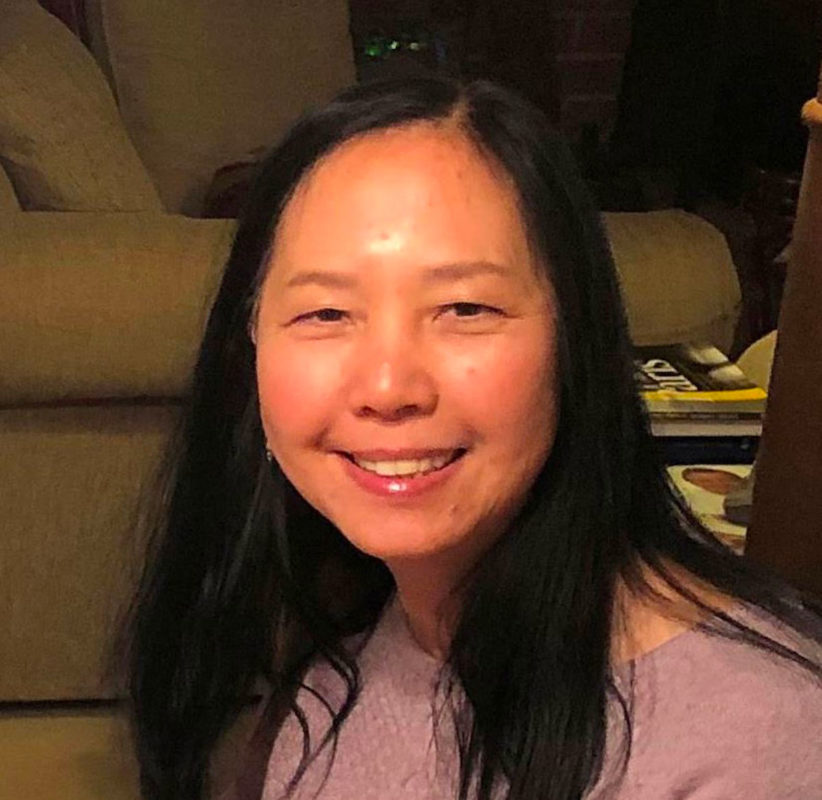
The current crisis presents a teachable moment for child therapist Nan Santiago. INQUIRER/Cherie M. Querol Moreno
As nervous residents heed state leaders’ orders to stay home to avoid spreading the flu-like illness, certain sectors of the community have no choice but to report for work in person.
Duty calls people in the health, finance, and law enforcement arenas to be at their stations and fulfill the job they are mandated by their license, certificate or oath.
That’s why San Francisco Federal Credit Union manager Jose Antonio’s daily routine remains the same while his friends in other professions work from home.
People are wary of their finances as the stock market plummets in response to the related national and world developments. Antonio oversees operations to see that transactions are completed efficiently and safely.
“We keep informed and abreast of the updates from reputable sources like state and city and CDC websites. We follow the basic and vital recommendation like washing hands, sanitizing, keeping distance from each other,” said Antonio, a 20-year banker who has learned to stay calm to allay staff fears even if he himself worries about the extent of the situation and its impact on his community.
“There’s clearly some anxiety and concern among employees. Some question why the bank still has to be open when other businesses are mandated to close. Staff feels that their health and safety is at risk by staying open. Transactions and client traffic have decreased, as many people heed the states warning of isolations and social distancing.”
Children seem less susceptible to the pervasive illness. The adverse situation, however, presents a golden moment for parents and counselors, according to a seasoned clinician.
Teachable moment
“For every crisis, there is an opportunity to learn,” licensed marriage and family therapist Nan Santiago told INQUIRER.net. “‘The children who are staying at home are learning to be with their families. They are discovering it is challenging and at the same time they can get through this together.
“The kids are also getting more sleep due to a less hectic schedule as they are being home- schooled or electronic learning. Kids are also learning to be more creative with art work while at home. We can appreciate the current moment we have with one another. Parents can continue to model calm behavior for the children to also feel centered.”
Santiago’s work involves individual and group consultations. She teaches cognitive behavioral treatment in group settings for families with anxiety, which has seen a spike as the rate of affliction by the corona virus increased.
A therapist with the Kaiser Child Psychiatry Department for 21 of her 35 years in the profession, Santiago herself has had to familiarize with alternative tools to help her clients.
“We have to provide more phone consultations to ensure the services are available and the members are safe and healthy,” she said. “We are also giving members options for video visits.” She hopes emergency consultation could also take place at the ED.
Service is a 24/7 matter for Daly City Mayor Glenn Sylvester, a retired sergeant with the San Francisco Police Department. As leader of the largest city in San Mateo County, Sylvester’s responsibility is to ensure smooth delivery of services to nearly 110,000 residents who are mostly female, foreign-born, and speak different languages; where the median age is 39, where 13 percent of the population is 65 and older, per the US Census. In his second turn as Mayor, the 4-year Council Member has been starting his day at 8 a.m. and shuts down at 2 a.m. the following morning.
“It is imperative to stay abreast of fluid changes happening almost every hour,” he explained to INQUIRER.net. “Information is provided to the public as I get them via social media channels, to reduce panic, and provide full transparency.”
Sylvester has been attending conference calls with state and county officials to get an accurate view of the situation to share with the public.
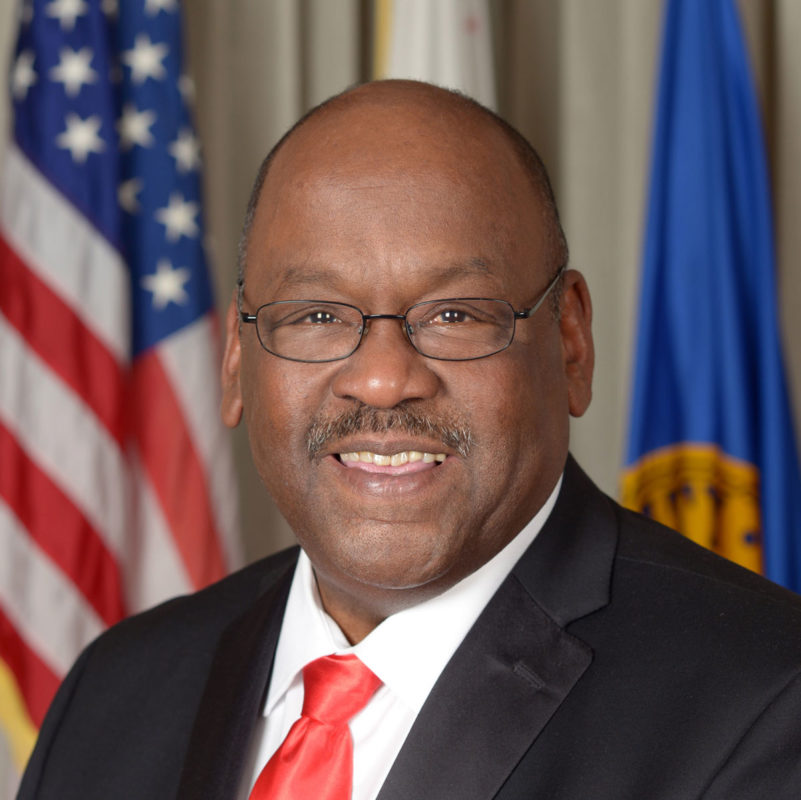
Accurate information is key to fighting the pandemic, says Daly City Mayor Glenn Sylvester. CONTRIBUTED
One day after California Governor Newsom mandated all Californians to shelter-in-place, Sylvester and the council staff had compiled and circulated a list of grocery store special accommodations and promotions for the elderly and disabled – the most vulnerable in the community.
He was among the first city council heads to issue a letter on the town website detailing information on closures and program changes, followed by a joint video with the City Manager, Police and Fire Chiefs.
Sylvester is able to work from home while staff performs administrative duties, he said in recognition of the town personnel.
The mood at City Hall is “very somber and quiet due to reduced staffing,” he echoed a recurring observation. “Folks are afraid and I feel it my priority to reduce fear, and yet remain cognizant of the issue at hand. I take an optimistic role that it (the crisis) will pass.”
Education is key
The mayor models physical distancing in person and on camera, in or out of the home. Exercising precaution is the first step toward safety, he said, drawing from his experience with San Francisco’s Finest and his family members’ occupation.
“They all are employed in essential services dealing with the public: police officer, DNA criminalist, nurse, respiratory therapist — I worry for them,” he admitted. To the community, he says, “Education is the key. I don’t want arrests (of those who flout the governor’s order), we have much more to worry about in our City. I ask for cooperation and that folks abide by the Stay at Home Order.”
His Vice Mayor Juslyn Manalo takes the order to heart, sending a photo of her son Ethyn with her dad from the window of her parents’ home, where the baby stayed while his mother was in quarantine and helping run Daly City by video.
“My prayers are for everyone on the frontlines — healthcare workers, public safety in police and fire, service industry whether cashier for grocery store, or delivery personnel as they are still doing duties,” she listed essential workers. “This is serious. Lives are at stake. When I see the younger generation still out not practicing social distancing – I want to remind them to think of their grandparents, their older parents, and those who paved the way for them that as statistically shown are the ones who can die from this.”
She belongs to the “sandwich generation,” seeing that her parents stay home and running their errands as she cares for her husband and son. But then she has a cough “from mid-December from the flu that has not gone away” that got her quarantined for 7 days by her doctor.
“My deep concern is that people have to understand that you can still be a carrier because some people are asymptomatic– show no signs at all. So that means, wash your hands, stay home and be mindful that you can have covid-19 without even having a cough, fever or shortness of breath.”
Manalo invokes a Filipino value that she hopes will help overcome the calamity: “If we take on the true meaning of ‘kapwa’ and the spirit of Bayanihan, we can beat this.”
***
For recommendations on maintaining mental health and well-being, visit:Maintaining Mental Health & Well-Being: Coping with Stress During Infectious Disease Outbreak

